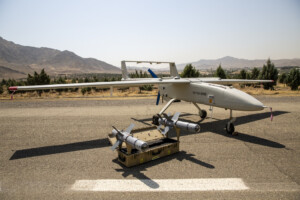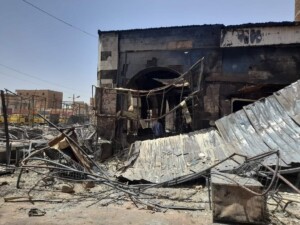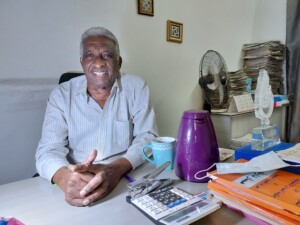Sudan timeline July-Sept 2019: Turbulent transformation from tyranny
2019 began full of hope in Sudan, after the December 2018 Revolution culminated in the overthrow by military coup d’état of the 30-year regime of Omar Al Bashir. However, the power struggle that followed under the subsequent Transitional Military Council (TMC) saw levels of violence and brutality to rival the deposed regime.
 Members of Sudan’s new Sovereign Council take their Oath of Office, August 21, 2019 (SUNA)
Members of Sudan’s new Sovereign Council take their Oath of Office, August 21, 2019 (SUNA)
2019 began full of hope in Sudan, after the December 2018 Revolution culminated in the overthrow by military coup d'état of the 30-year regime of Omar Al Bashir. However, the power struggle that followed under the subsequent Transitional Military Council (TMC) saw levels of violence and brutality to rival the deposed regime.
After a turbulent start, the second half of the year has seen the junta and opposition agree on power-sharing, the appointment of the Sovereign Council and a civilian Prime Minister and Council of Ministers, distinct signs of Sudan being re-admitted into the international community –which played a major part in mediating the agreements– and rounds of successful peace negotiations with the armed movements brokered by South Sudan.
August saw the deposed President Al Bashir appear before a Khartoum court on charges of corruption and currency fraud, however the debate still rages in Sudan whether to extradite the former dictator to The Hague to face charges of war crimes, crimes against humanity, and genocide at the International Criminal Court (ICC).
The transition has not been plain sailing, with at least two counter-coups foiled. These bear witness to elements of the “deep state” – remnants of the Al Bashir regime – that that are still to be found in many corners of officialdom, and potentially form a threat to stability on the road to democracy.
The country’s economy, still bent under the yoke of the 30-year Al Bashir kleptocracy, is burdened by crippling international debts and an ailing Pound that continues to drop in value against hard international currencies.
Seasonal natural and environmental challenges have also faced the fledgling new government, including devastation by flash floods and a cholera epidemic.
Emboldened by the success of the December Revolution, the Sudanese public have frequently voiced their dissatisfaction with various issues, so that strikes by doctors, teachers, farmers, and other professionals are frequent.
Radio Dabanga, which has been at the forefront of coverage from the start, has compiled this timeline to give an overview and perspective of events in Sudan during the third quarter of 2019.
July 2019: Sudan’s military rulers, opposition reach power-sharing agreement
July 1: Massive demonstrations across Sudan call for a civilian-led government. At least 10 protesters were killed. The ruling Transitional Military Council (TMC) says it is willing to negotiate with the Forces for Freedom and Change (FFC, aka Alliance for Freedom and Change).
July 2: Junta accuses the FFC of provocations during the protests on July 1. Demonstrators in Omdurman hold the military responsible for the violence.
July 3: Dollar rate drastically rises again. Activists accuse the European Union of indirectly funding the Rapid Support Forces (RSF), Sudan’s largest government militia, by farming out its migrant policy to Sudan and other countries known for systematic human rights abuses.
July 4: A delegation of the Arab League arrives in Khartoum to attempt to reach consensus between the junta and the opposition. The AU mediator says the two parties agreed on many issues. Sudanese authorities impose new restrictions on the Internet.
July 5: The military rulers and the FFC agree on a power-sharing arrangement. Marches in several Sudanese cities and towns affirm the people’s support to the FFC. More than 200 released rebel prisoners say they were tortured in detention.

August 30, 2019 (SPA)
July 6: Thousands of Sudanese take to the streets in various cities to celebrate the power-sharing deal. The Sudan Revolutionary Front rebel alliance however denounces the agreement.
July 8: The chairman of the junta expresses the military’s commitment to the agreement with the opposition. The FFC cancel actions against the junta, organise activities in support of the accord instead.
July 9: Deputy Chairman of the TMC and Commander-in-chief of the RSF militia, Lt Gen Mohamed Hamdan ‘Hemeti’, acknowledges “chaos” during the violent dismantling of the Khartoum sit-in on June 3 whereby more than 120 people were killed.
July 10: Internet is turned back on in the country after a shut-down of almost one month. A delegation of Sudanese opposition leaders attends the dialogue on Sudan during the 41st session of the UN Human Rights Council.
July 11: Sudanese activists publish footage of militia abuses during the June 3 massacre on social media. The Sudanese Telecommunications Professionals Association calls for immediate compensation to subscribers for damages caused by the Internet shut-down.
July 12: The ruling Military Council claims it foiled an attempted coup d’état in Khartoum. The Darfur displaced reject the power-sharing deal between the junta and the FFC.
July 13: The Military Council and the FFC discuss the contents of the Constitutional Document that will define the government bodies to be established for a three-year transitional period, after which general elections will be held.
July 15: Demonstrations in Khartoum and several state capitals commemorate the violent dismantling of the Khartoum sit-in on June 3. The FFC present its objections to the draft text of the Constitutional Document.
July 16: The University Professors’ Association call for dismissal of rectors affiliated with the regime of Al Bashir. In Sennar, people protest the RSF militia shooting of demonstrators, whereby one person was killed and many others were wounded.
July 17: The junta and the FFC sign the power-sharing agreement in Khartoum. According to the Sudanese Professionals Association, the draft of the Constitutional Document only reflects TMC proposals. EU Envoy discusses Sudan with the Arab League in Cairo.
July 18: The Sudan Revolutionary Front rebel alliance declares its categorical rejection of the TMC-FFC power-sharing deal, while the international community applauds the agreement. The RSF announces it will withdraw its militiamen from Khartoum, depending on the security situation.
July 19: The National Umma Party (NUP) welcomes the power-sharing agreement. Marches in Sudan express solidarity with people raped during the Khartoum massacre on June 3. Food prices are soaring in the country.
July 20: The Sudan Doctors Central Committee reports that at least 246 people were killed and 1,353 others injured since the uprising against the Al Bashir regime began in mid-December. Members of the National Consensus Forces coalition of leftist opposition parties expresses strong reservations about the power-sharing deal. People in Darfur and northern Sudan suffer from acute fuel and bread shortages.
July 22: Protest vigils are held in several cities in solidarity with the victims of the June 3 massacre. The committee of inquiry into the violent dispersal of the Khartoum sit-in on June 3, submits its findings to Sudan’s acting Attorney-General. Six protestors are detained in South Darfur. Gunmen wearing RSF militia uniforms kill six villagers in North Darfur.
July 23: The Sudan Revolutionary Front rebel coalition, discussing the transition to peace with the FFC in Addis Ababa, reports mutual agreement on 11 points. The EU suspends projects targeting illegal migration in Sudan.
July 24: Vigils across Sudan demand to know the fate of people who went missing during the Khartoum massacre on June 3. The Sudan Liberation Movement under the leadership of Abdelwahid El Nur claims to have repelled an RSF militia attack on its fighters in Darfur’s Jebel Marra.
July 25: Sudan Armed Forces foils an attempted military coup led by the head of Joint Chiefs of Staff. Officers of the National Intelligence and Security Service (NISS) bar the Forces for Freedom and Change (FCC) from holding a symposium in Khartoum. The first batch of 1,000 RSF militiamen arrive in Libya to protect oil installations in favour of Libyan Gen Khalifa Haftar.
July 26: The FFC and the Sudan Revolutionary Front rebel coalition agree that reaching peace must be a top priority for the coming government. Members of the Sudanese Professionals Association meet with the Sudan People’s Liberation Movement-North faction led by Abdelaziz El Hilu (SPLM-N El Hilu) in Addis Ababa. Sudanese universities suspend studies until the situation in the country improves.
July 28: The FFC legal committee finalises its comments on the final draft of the Constitutional Declaration. More arrests take place after the foiled coup. Sudanese complain about rapidly rising prices. Many medicines are unavailable.
July 29: RSF militiamen shoot four protesting secondary school children and another demonstrator dead in El Obeid, capital of North Kordofan. Street protests in Khartoum, sparked by the announcement of the results of the investigation into the June 3 massacre.
July 30: The killing of school students in El Obeid sparks large demonstrations across Sudan.
July 31: Protests condemning the ‘El Obeid massacre’ continue. The Military Council orders the closure of all basic and secondary schools in the country for an indefinite period of time. The National Umma Party says the violent dismantling of the Khartoum sit-in on June 3 was premeditated. According to the Darfur Bar Association, the ruling Military Council is responsible for the June 3 massacre.
August: Agreements on a civilian-led government, PM appointed
August 1: The trial of ousted President Omar Al Bashir begins in Khartoum. The SPLM-N El Hilu in South Kordofan declares an immediate unilateral cessation of hostilities. The Communist Party of Sudan withdraws from FFC negotiations with the ruling junta. Protests against the killing of demonstrators continue in the country. Four people are killed when security forces shoot at demonstrators in Omdurman.
August 2: The EU calls on the junta and FFC to set their differences aside and reach an agreement to pave the way for a civilian-led transition. Seven RSF militiamen are arrested for shooting at peaceful protesters in El Obeid on July 29.
August 3: The Military Council and the FFC agree on the contents of the Constitutional Document. Members of the RSF assault young North Darfuris in Kutum.
August 4: Representative of the junta and the FFC sign the Constitutional Document, paving the way for the formation of an interim government of technocrats. Sudanese across the country complain about being hardly able to make ends meet.

Constitutional Document during the signing ceremony in Khartoum, August 4, 2019 (SUNA)
August 5: People in Khartoum celebrate the signing of the Constitutional Document. Saudi Arabia, the UAE, and Egypt welcome the agreement, while Sudan's armed movements reject it.
August 6: Displaced people in Darfur denounce the Constitutional Document deal. According to the Sudanese Congress Party, comments of the armed movements on the Constitutional Documents must be taken into consideration before the final signing of the document. The SPLM-N El Hilu faction in South Kordofan, the Corrective Beja Congress, and the Darfuri Sudan Liberation Forces Alliance, form the Kush Alliance.
August 7: The Documentation Initiative for the Khartoum Massacre reports that large parts of the University of Khartoum were plundered and destroyed on June 3. Sudanese continue to demonstrate for freedom and justice.
August 8: Inflation climbs again in the country. Visiting US Under-Secretary for Political Affairs affirms that his country will support the Sudanese during the three-year transition period. The British Special Representative for Sudan concludes his first Khartoum visit.
August 9: The ruling junta cancels the death penalty issued against SPLM-N leaders in 2014. According to the Sudan Liberation Movement headed by Abdelwahid El Nur, the junta and the opposition kidnapped the revolution. The Sudanese Professionals Association and the National Umma Party say they will not take part in the upcoming interim government. More than 100 people who were present at the Khartoum sit-in on June 3 are still missing.
August 10: The African Union mediator in Sudan expresses his concern that women may not be adequately represented in the upcoming interim government. Sudanese medics complain about the deterioration of their work environment.
August 12: The chairman of Sudan’s Military Council, Lt Gen Abdelfattah El Burhan, pledges to make the interim period successful. Sudan rebel leaders to discuss agreements with FFC in Cairo.
August 13: Torrential rains and floods cut-off roads, causing price hikes across Sudan. Economists call on Sudan’s upcoming transitional government to exert efforts to remove the country’s name from the US list of State Sponsors of Terrorism.
August 14: The Constitutional Document gives the FFC the right to select 67 per cent of the Legislative Assembly members. The remaining 33 per cent are allocated to non-signatory forces.
August 15: Representatives of people killed during the December Revolution will hold the authorities accountable. Washington refuses to grant Salah Abdallah ‘Gosh’, former head of the security apparatus, access to the USA.
August 16: The FFC nominate economist Abdallah Hamdok as Prime Minister. South Sudanese President Salva Kiir discusses peace issues with the leader of the Justice and Equality Movement. Calls for help as rains leave four more dead, thousands of people have become homeless.
August 17: With the official signing of the Constitutional Document, Sudan three-year transition to democracy begins. People from Atbara in northern Sudan arrive in Khartoum on the ‘freedom train‘ for celebrations. The FFC complete the selection of the candidates for the Sovereign Council.
August 18: The international community congratulates Sudan on the signing of the agreements. The Sudanese Women’s Union disagrees with the candidates FFC proposed for the Council of Ministers. Al Jazeera media channel is allowed to reopen its office in Khartoum. People various parts of the country complain about bread and fuel shortages.
August 19: The Sudan Liberation Movement of Abdelwahid El Nur accuses members of the RSF militia of killing villagers in North Darfur’s Tawila. Ousted President Omar Al Bashir is questioned in a Khartoum court concerning corruption charges.
August 20: The Transitional Military Council (TMC) reports that the establishment of the Sovereign Council has been postponed for 48 hours, as requested by the FFC. The junta blocks judiciary appointments of people nominated by the FFC.
August 21: The chairman of the TMC, Lt Gen Abdelfattah El Burhan, is sworn-in as chairman of the Sovereign Council, together with four military and six civilian other members.
August 22: The Sudan Revolutionary Front rebels alliance accuses the FFC of hijacking the revolution. The UN Security Council welcomes the establishment of a civilian-led government in Sudan.
August 23: New Prime Minister Abdallah Hamdok sets ‘peace’ and ‘economy’ as top priorities. Relatives of former janjaweed leader Musa Hilal, detained in North Darfur in 2017, organise a vigil in Khartoum demanding his release. The Sudanese Women’s Union demand a 50% participation of women in the government.
August 24: More than 193,000 people are affected by rains and floods in the country. Relatives and friends of protesters killed during the Sudan uprising stage a commemoration vigil in Khartoum.
August 25: The FFC says it made a mistake by not prioritising the peace file over the Constitutional Document. The University of Khartoum suspends studies indefinitely because of the extremely low attendance of students.
August 26: PM Abdallah Hamdok insists on an interim government of technocrats. Omar Al Bashir’s trial continues. The No To Women’s Oppression Initiative renews its call for more women in government institutions.
August 27: The FFC demand that the government declare Sudan a natural disaster zone following widespread destruction caused by heavy rainfall and flash floods.
August 28: Washington says it wants to test the commitment of Sudan’s new government before removing the country from the US state Sponsor of Terrorism list.
August 29: The Sudanese Professionals Association reports that 43 protesters who went missing during the violent dismantling of the Khartoum sit-in on June 3 have been found.
August 30: The trial of the officials accused of torturing a teacher to death in eastern Sudan in February, resumes. The Sudanese Ambassador to the UN calls upon the Security Council to pave the way for Unamid’s withdrawal by June 2020.
September: New Cabinet formed, Sudan’s three-year interim period starts
September 1: The Sudan Revolutionary Front rebel alliance denounces the nominations of ministers for the interim government. The Judges’ Association adheres to the appointment of Abdelgadir Ahmed as head of the judiciary in Sudan.
September 2: Deposed President Al Bashir is officially charged for illegal ownership of wealth and possession of foreign currency. Four Darfur armed movements to jointly enter the peace talks with the interim government.

September 17, 2019 (Social media)
September 3: Sudan militia chief Mohamed Hamdan ‘Hemeti’ warns of ‘sleeping cells‘ seeking to thwart the new interim government. PM Hamdok instructs the resumption of the school year in mid-September. Water- and mosquito-borne diseases are spreading throughout the country amid medicine shortages.
September 4: The Darfur Bar Association will set up a Consultative Forum to bring together civil forces and the Darfur armed movements. The Blue Nile state Doctors’ Committee reports the death of two people suffering from ‘acute watery diarrhoea‘ (possibly cholera).
September 5: Protest actions in Khartoum and other areas of Sudan to highlight social and economic grievances. People in Kalogi in South Kordofan continue their sit-in against the use of toxins in gold mining. SLM-TC leader El Hadi Idris is chosen as chairman of the Sudan Revolutionary Front.
September 6: Prime Minister Abdallah Hamdok presents his transitional government. Four out of 18 ministers are women. South Sudanese President Salva Kiir meets with leaders of the Sudan Revolutionary Front in preparation for the Sudanese peace talks to be held in Juba.
September 7: Hamdok delivers key note speech at the opening session of the UN Coordination Meeting in Khartoum. SPLM-N El Hilu decides to join the upcoming peace negotiations in Juba.
September 8: Staff of the International Mining Group in South Kordofan arrested for alleged burial of toxic substances. The Blue Nile state Doctors Committee warns of a cholera epidemic. The former office manager of Al Bashir admits that the former president handed out more than €10 million to government militias and institutions in the month before he was deposed.
September 9: South Kordofan activists threaten to attack gold mining plants in Talodi locality.
September 10: Egypt is exerting efforts to have Sudan removed from the US list of State Sponsors of Terrorism. The Sudanese Professionals Association expresses support to the new Sudanese Cabinet. Deputy chairman of the Sovereign Council and Commander-in-chief of the RSF militia Lt Gen Hemeti meets with rebel leaders of the Sudan Revolutionary Front in Juba. A military court in Khartoum resumes proceedings for the trial of former janjaweed leader Musa Hilal.
September 11: The Sudanese government and the armed movements sign a Declaration of Principles in Juba, which will function as basis for the peace neotiations. The Ministry of Health confirms four cases of cholera in Blue Nile state (contrary to the government of deposed President Al Bashir that refused to acknowledge the contagious disease).
September 12: PM Hamdok meets with the South Sudanese president in Juba to discuss the upcoming peace talks and the opening of borders for free trade. High food prices pushed-up inflation in August. North Darfur farmers freely demonstrate in El Fasher, demanding protection from herdsmen.
September 13: Massive rallies organised by FFC in the country demand an independent judiciary. Lawyers file a complaint against the Sudanese Radio and Television Corporation because of two films, shown in June, portraying Sudanese demonstrators as saboteurs and murderers.
September 14: The Red Sea state Public Prosecution charges 15 state officials with corruption and waste of public funds. Fuel and bread shortages in Khartoum and Kassala. Sudan’s Minister of Health visits cholera patients in Blue Nile state. The acting governor of South Kordofan halts all gold mining activities in the state.
September 16: As gold mining plants do not comply to the governor’s order, protests in South Kordofan against gold mining companies continue.
September 17: Sweden, France, and the Arab League pledge support for Sudan. The killing of three displaced people by gunmen wearing RSF militia uniforms in South Darfur’s Mershing sparks a large demonstration in the town. The military court trying Musa Hilal denies defence lawyers access.
September 18: The Sudanese Women’s Union calls for a repeal of laws restricting freedoms.
September 19: UN Secretary-General hopes Sudan will be soon removed from US list of State Sponsors of Terrorism. Protests across Sudan address public dissatisfaction about practices by authorities affiliated with the former regime. The Darfur Bar Association says the trial of former janjaweed leader Musa Hilal lacks any legal ground.
September 20: Tens of thousands of Sudanese across the country take to the streets demanding the prosecution of corrupt members of the former regime. The Sovereign Council repeals the death penalty for eight leaders of the SLM led by Abdelwahid El Nur. The Council also orders the dissolution of ‘Jihadist units‘ at Sudanese universities. The sit-in in Talodi in South Kordofan against the use of toxins by gold mining companies enters its 17th day.
September 22: The Public Prosecutor in Omdurman issues an arrest warrant for Salah Abdallah ‘Gosh’, former director of the former National Intelligence and Security Service (NISS), on charges of murder. Ousted President Al Bashir, detained in Khartoum, will be charged with murder as well. The former director of the Revenues Department at the Presidential Palace and his son are charged with corruption. Two people die of cholera in Sennar.
September 23: PM Hamdok forms a commission of inquiry into the violent dismantling of the Khartoum sit-in on June 3. Protests against gold mining operations continue in South Kordofan’s Talodi. People in Wadi Halfa in Northern State also protest the use of toxics in gold mining.
September 24: Sudan’s Prime Minister to seek $2 billion support from the World Bank. Thousands of Sudanese join rallies in the country calling for peace and justice in Darfur. Darfur displaced want to participate in the peace negotiations between the armed movements and the government.
September 25: The Minister of Finance and Economic Planning announces efforts to lift economic sanctions on Sudan and to retrieve stolen Sudanese funds illegally siphoned abroad. The UN High Commissioner for Human Rights signs an agreement with Sudanese government to open a UN Human Rights Office in Khartoum. Egypt and Qatar call for the removal of Sudan from the US list of State Sponsors of Terrorism.
September 26: Sudan signs the International Undertaking for Media Freedom. A delegation of the Sudan Revolutionary Front rebel alliance will visit Khartoum to discuss the upcoming peace talks. Nine Sudanese file a criminal complaint against the BNP Paribas bank for complicity in crimes against humanity and genocide in Sudan.
September 27: The Sudanese National Human Rights Commission denies involvement of the then Transitional Military Council in its report on the June 3 massacre. The Association of Families of December Revolution Victims condemns the report.
September 28: Addressing the 74th session of the UN General Assembly, the Sudanese Prime Minister calls on the USA to remove Sudan from its list of countries that sponsor terrorism, and to lift all sanctions against Sudan.
September 29: Lt Gen Abdelfattah El Burhan, Chairman of the Sovereign Council, launches a disarmament campaign in Darfur. The medical student who was raped during the violent dismantling of the Khartoum sit-in on June 3, dies by suicide.
September 30: Lt Gen Mohamed ‘Hemeti’, Commander-in-chief of the RSF militia, calls upon tribal leaders in Darfur to collect weapons from the population. Unidentified groups attack homes of political activists and party cadres in Khartoum. The Sudanese Health Ministry reports a total of 215 cholera cases in Blue Nile and Sennar states.
Previous timelines:
How did civil discontent propel Sudan towards the overthrow of Al Bashir?
Sudan uprising: Timeline of tumultuous change
Our editorial independence means that we can continue to provide factual updates about political developments to Sudanese and international actors, educate people about how to avoid outbreaks of infectious diseases, and provide a window to the world for those in all corners of Sudan. Support Radio Dabanga for as little as €2.50, the equivalent of a cup of coffee.












 and then
and then